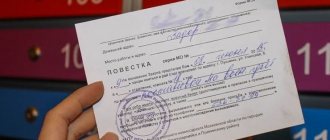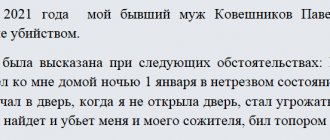Most entrepreneurs believe that a one-day company is the responsibility of only its director. This is far from true. Responsibility is also provided for partners of such a company.
Anyone who works with unreliable, law-breaking companies is considered to be participating in fraudulent schemes. And any director can easily become a member of a criminal group. And the tax authorities “have no problems” with evidence in the courts.
On the same topic:
Why do tax authorities win 80% of cases involving unjustified tax benefits?
Therefore, it is very important to promptly exclude fictitious organizations or those with signs of fictitious organizations from among your partners.
Where did the “ephemera” come from?
have long been one of the serious shortcomings in the Russian economic system.
But they became especially noticeable on the eve of Russia’s accession to the WTO. “One-day events” began to appear after the collapse of the USSR in the 90s. And if at first they were used for fraud, when they did not submit reports to the tax inspectorates and were quickly liquidated (for which they received the nickname “fly-by-night”), now such organizations are firmly entrenched in the Russian market. They have existed not for a month, but on average for about a year, formally report to the tax authorities and have nominal founders and directors.
The most common purpose of fly-by-night scams is tax evasion, theft from the budget and laundering large sums of money. With the help of so-called system firms, entrepreneurs usually refund VAT, cash out funds and redistribute shares.
Why are ephemera so popular?
There are several answers here.
Firstly, there is no legal alternative for false companies to reduce tax payments. Thanks to a systemic company, you can save on personal income tax, income tax and VAT. Statistics show that more than half of organizations in Russia (60%) are in the “shadow”. These are mainly small and medium-sized businesses. They are ready to take risks and work in the sector of systemic firms, because they are not able to apply complex tax optimization schemes, and they cannot afford the services of highly qualified lawyers and analysts.
Large companies widely use “fake” companies for financial fraud and money laundering. For example, partners of fake firms can carry out schemes with fictitious costs and at the same time cash out large sums of money uncontrollably. With the help of ephemeral accounts, financial flows between companies are controlled. Let's say, within the same holding. Here, as in the case of medium-sized businesses, settlements with “one-day” accounts optimize income tax and VAT.
The second good reason is competition. If an organization keeps “white” accounting, it means it gives a larger part of its income to the treasury than less conscientious competitors. To stay afloat, it has to increase the price of its product or service. Contractors are faced with a choice: either pay more or cooperate with a fly-by-night company. Few people want to work at a loss, and often choose the latter.
Responsibility and fines for working with shell companies in 2021
When working with shell companies, not only the organizers of the tax evasion scheme are at risk, but also all the partners of the shell.
If a company is accused of tax evasion, all settlements with this company may become invalid. Tax officials will recalculate tax liabilities and require all participants in the scheme to pay additional taxes.
Participants in transactions will have to pay arrears, penalties and fines, up to 40% of the amount of unpaid obligations to the budget in accordance with Article 122 of the Tax Code of the Russian Federation.
In addition to financial losses, there are also risks of losing your business reputation. A company that was a one-day partner may be included in the register of unscrupulous companies.
Federal Tax Service against
The Federal Tax Service is seriously concerned about this state of affairs in the economy. The head of the Federal Tax Service, Anatoly Serdyukov, even made a report on this issue in the State Duma.
Opinion of
Anatoly Serdyukov, head of the Federal Tax Service:Currently, on average, over two thousand legal entities are registered per day. From the practice of the Service, it is clear that more than 50 percent of organizations are created to participate in tax evasion schemes.
Within the framework of current legislation, tax authorities can only suspend transactions on accounts. However, these actions only shorten the life of the problematic organization, but do not improve the situation as a whole. Therefore, it can only be resolved at the legislative level. The corresponding proposals have already been prepared jointly with the Central Bank, the Ministry of Internal Affairs, the FSB and the Federal Customs Service.
As we know, decisions have already been made to exclude more than 120 thousand organizations from the Unified State Register of Legal Entities. By the end of the year, according to the Federal Tax Service of Russia, the number of forcibly closed organizations will already be 600 thousand.
Plan to combat fly-by-nights
To destroy false companies, the tax service decided to act from several sides. To begin with, the Federal Tax Service plans to increase the minimum authorized capital of organizations to European standards: for limited liability companies and closed joint-stock companies - up to 25 thousand euros, for open joint-stock companies - up to 100 thousand euros.
Opinion of
Sergey Dukanov, Head of the Department of State Registration and Accounting of Legal Entities and Individuals of the Federal Tax Service of Russia:This norm will not affect the procedure for creating production cooperatives, general partnerships and limited partnerships. In production cooperatives, the contribution amount can be 1-2 kopecks, in partnerships it’s the same. But there is a limitation: you need to bear full financial responsibility. If you haven't saved up enough money for a limited liability company, create a cooperative, partnership, or become a sole proprietor.
The Federal Tax Service also proposed compiling a list of objects that can be contributed to the authorized capital and limiting it to money, securities, real estate and vehicles. Now this list is practically unlimited by the legislator.
Moreover, in order to identify “one-day cases”, the tax service has developed an official instruction for its employees.
Moscow was the first to join the fight against such companies. In the capital, before other cities, regulations were issued for the Federal Tax Service No. 46, since it is the latter that is responsible for registering all city organizations. The document provides detailed instructions on how to combat illegal companies at all stages of registration: from the moment the manager brings documents for registration to its verification before entering it into the register.
Document fragment
Regulations on the actions of the Moscow tax authorities to counter the creation and operation. Section II “Complex of measures carried out by the Interdistrict Inspectorate of the Federal Tax Service of Russia No. 46 for Moscow”, paragraph 4
At the stage of analyzing the documents submitted for state registration of a legal entity upon creation, an employee of the legal department, who accepted the documents according to the register from the document acceptance department, selects documents received for state registration and having a mark indicating that the organization has characteristics and transfers them to employees performing direct work with this category of documents. When checking the accuracy of the information specified in the documents submitted for state registration, and if unreliable information is revealed, a decision is made to refuse state registration:
- when a match is identified at the “mass” registration address and the registration authority has a statement (letter) from the owner of the “mass” registration address to prevent the registration of a legal entity without its written consent;
— when identifying the unreliability of notarial actions when certifying applications for state registration;
— when it is revealed that payment documents are unreliable during state registration of a legal entity;
- if the documents contain information about an invalid or “old” passport.
Simultaneously with the decision to refuse state registration, the employee responsible for carrying out control measures prepares the necessary documents to initiate a case of an administrative offense in accordance with Article 14.25 of the Code of Administrative Offenses.
If there are no grounds for refusal of state registration, a decision is made on state registration of the legal entity. If the Moscow City Internal Affairs Directorate confirms the information about the “mass” applicant, the documents are transferred to the employee responsible for carrying out control measures to take appropriate measures (administrative responsibility, Part 3, Part 4, Article 14.25 of the Code of Administrative Offenses of the Russian Federation).
On the fifth day, decisions to refuse state registration are transferred to separate registers for issuance to the applicant and the preparation and signing of a protocol on the administrative offense.
First of all, the tax authorities compiled lists of mass registration addresses, that is, those for which more than ten organizations have already been “registered”. Now, if such an address is revealed when checking the documents of a new company, the company is denied registration. In addition, in parallel with the address on another “black” list, inspectors also check the identity of the manager.
If the name or address matches, the inspector calls the applicant to draw up a protocol on an administrative offense under Article 14.25 of the Code of Administrative Offenses. The list of documents received from the applicant is printed in four copies, and a mark indicating the presence of signs is placed on them. The inspector transfers copies to the security service employees of the inspection and the Moscow City Department of Internal Affairs for carrying out activities within their competence (Section II, clause 3 of the “Regulations for the actions of the Moscow tax authorities to counter the creation and operation”).
Nominee directors on whom a dozen organizations are already “hanging” have the right to be disqualified on the basis of paragraph 4 of Article 14.25 of the Code of Administrative Offenses for up to three years, and the “one-day” company itself to be excluded from the Unified State Register of Legal Entities.
According to the head of the Department of State Registration and Accounting of Legal Entities and Individuals of the Federal Tax Service of Russia, Sergei Dukanov, such measures will contribute to the legal liquidation of companies.
Opinion of
Sergey Dukanov, Head of the Department of State Registration and Accounting of Legal Entities and Individuals of the Federal Tax Service of Russia:Many companies are asking to be closed administratively. Indeed, in this case, the founders of the liquidated company are freed from the burden of bearing the costs of liquidation; the state itself bears these costs. Therefore, we propose to amend the legislation, according to which the founders of liquidated companies will be deprived of the right to be founders of other organizations for three years.
The norm will work according to the principle: either you liquidate the organization yourself, or you lose the right to be a founder for three years. This norm will stimulate the legal liquidation of legal entities, settlements with creditors, payment of wages, preparation of all reports, and so on.
However, Moscow was not alone in its desire to clear the state register of false companies.
The initiative of the center was taken up by the West Siberian Federal District. Following the capital in Novosibirsk, the tax authorities began a massive check of legal addresses. If the company was not there, the accounts of the suspicious organization and its counterparties were immediately blocked until the circumstances were clarified. We also note that the Moscow regulations expand the powers of the desk inspection department. Now they are obliged to check all capital firms without exception with zero reporting. In this case, the inspector must contact the bank to obtain information about monetary transactions on the client’s accounts.
In addition, the tax service proposes to make it more difficult to change the legal address of an organization. For example, when moving a company, conduct a desk audit.
The Russian Ministry of Economic Development shares the point of view of tax authorities on the need for a tough fight against fictitious companies and is going to present its developments on this issue. The ministry is creating a database of stolen or lost passports, which can be used to register false companies. It is planned that this database will be available not only to tax authorities, but also to entrepreneurs. Thus, any businessman will be able to check his counterparty. In addition, they want to tighten the criminal liability of the founders. However, unlike the law enforcement agencies and the Ministry of Finance, the Ministry of Economic Development does not agree with the tightening of the procedure for registering organizations.
The Federal Service for Financial Monitoring (FSFM) also came to the fight against fly-by-night companies, proposing its own measures to reduce their number. It is expected that the service will strengthen control over companies suspected of money laundering by freezing accounts on false lists. As we noted above, the main reason for excluding organizations from the register and refusing registration is the coincidence of its data with “black” lists. The goal of the Federal Tax Service is to compile them for all Russian cities. The compilation of a database began with a list of suspicious organizations in the capital. According to the regulations, the Federal Tax Service of Moscow began compiling the following registers:
— mass registration addresses (from 10 organizations at one address or more);
— persons submitting documents for state registration by proxy by couriers (from 10 organizations or more);
— founders-managers who are such in a number of already created legal entities (from 10 organizations or more);
— founders who are such in a number of already created legal entities (from 10 organizations or more) (section I, clause 1 of the Regulations of the Moscow Federal Tax Service on combating “fly-by-night companies”).
To determine the reality of the legal address, employees of the department of state registration and registration of taxpayers of the inspection are required to conduct an inspection of the premises at the location of the organization, which is indicated in the constituent documents. This must be done in order to determine whether the information is true. If it does not comply, then the inspector draws up an act on the basis of which the Federal Tax Service will hold the manager accountable for providing false information about the location of the legal entity, which is provided for in Part 3 of Article 14.25 of the Code of Administrative Offenses.
After which the tax authority will send a notification to the organization about summoning the official to the inspectorate to draw up a protocol on the administrative offense. In addition, the registration authority is obliged to conduct surveys of the heads of organizations providing premises for rent to such taxpayers (section III, paragraph 2 of the Regulations of the Moscow Federal Tax Service on combating fly-by-night companies).
In the capital, the first version of the “black” lists is already ready. It contains about eight thousand addresses and about three thousand names. As part of the implementation of the Regulations and, as indicated in the covering letter, in accordance with paragraph 5.2 of Article 7 of the Law of 08/07/2001 No. 115-FZ “On combating the legalization (laundering) of proceeds from crime and the financing of terrorism”, the lists are already sent to capital banks. The Tax Service strongly recommends not opening accounts for the companies listed in them.
We think that the lists will be adjusted. There are several reasons for this:
1. By default, the list of “suspects” includes all addresses where more than ten organizations are registered. But the compilers of the lists overlooked a number of large buildings, for example, business centers, where hundreds of companies rent premises. For example, JSC Russian Railways, All-Russian Exhibition Center and other large centers were included in the lists.
2. The list of nominee directors included such well-known businessmen as co-owner of the Last Minute Travel Store chain Andrei Ozolin, co-owner of Mercury Leonid Fridlyand and even the governor of the Kaliningrad region Georgy Boos. In addition, those managers in whose name regional representative offices and branches were opened were in the “risk zone”.
3. There is one more reason, although not as serious as the first two, but no less unpleasant. Initially, eight thousand addresses and more than three thousand names were submitted and distributed in paper form. And this takes a total of 117 A4 sheets. It took bankers a lot of time to compile an electronic database of them.
4. In addition, all registrar companies came under attack from the Federal Tax Service. Now their activities are considered illegal. Has this led to the closure of such organizations? No. As a result, they simply increased the price of their services. According to verified data, now the tariffs of the capital's registrars have increased 4 times and range from 400–500 US dollars.
At this stage, the main task of any company has become the need to avoid being blacklisted. But it's not that simple. If this happens, the tax authorities will issue an order to the organization to correct the violation (that is, not being at the place of “registration”). You must respond to this official document within a month: either move or change your legal address. Those who do not correct themselves will first face a fine of five thousand rubles, and later suspension of their activities. This means that the organization will only be able to pay taxes and salaries, but will be prohibited from taking part in transactions. Even temporary suspension of activities will be recorded in the state register.
What are the dangers of selling goods through one-day sales?
TaxCoach experts talk about creativity in action and its consequences.
When conducting tax audits, inspectors, as a rule, pay more attention to the validity of the expenses declared by taxpayers than to the completeness of their reporting of revenue. In this regard, entrepreneurs have long stocked up on evidence of their exercise of “due diligence” when choosing suppliers, information about the counterparty’s possession of the resources necessary for the transaction and, in principle, evidence of the reality of the transaction itself. Otherwise, and if the supplier has signs of a “one-day company”, the legality of VAT deductions and, possibly, income tax expenses will be denied.
However, today claims from tax authorities may be related to the “problematic nature” of any counterparty of the taxpayer, including the buyer. Registration of sales through controlled buyers, who retain most of the taxpayer's markup and thereby underestimate his tax obligations, is a method of aggressive tax optimization that has long been well known to inspectors.
What does this mean?
If we are talking about applying a VAT tax rate of 0% when exporting, or when goods are sold to interdependent organizations at obviously low prices for which there are no reasonable explanations, then the answer is obvious: accordingly, prices will be recalculated, VAT and income taxes will be added.
Sometimes the Federal Tax Service uses several “creative” methods that, without recalculating prices and invalidating transactions, allow additional income tax and, in some cases, VAT to be charged.
As a rule, there are three possible scenarios:
First. Recognition of a “scheme” created in order to understate the revenue of the taxpayer-supplier.
This is the most common option for tax authorities.
In this case, the activities and relationships with the “fly-by-night” are recognized as feigned, covering up the relationship between the seller and the final buyer.
For example, the seller uses intermediaries, including those who use “special regimes” (STS and UTII), who sell the goods to the final buyer. If in this case the Federal Tax Service establishes and can prove that the intermediary is a fictitious organization, and the supplier carried out all relationships directly with the final buyer, then the risky counterparty will be excluded from the chain of sales of goods. As a result, the taxpayer will be charged additional VAT and income tax on the entire amount of the sale to the final buyer.
Second option. Additional assessment of income tax in connection with the exclusion of expenses for a disputed transaction.
In this case, the tax authorities proceed from the fact that since the buyer is a fictitious person, then there was no delivery.
As a result, the tax office refuses to recognize expenses associated with the purchase of goods sold to a “defective” counterparty. The fact is that, according to paragraph 1 of Art. 272 and Art. 318 and 320 of the Tax Code of the Russian Federation, these costs can only be taken into account when selling goods. No sales - no expenses. For example: a product is purchased, a buyer is found, money is received. The taxpayer-supplier shipped the goods and boldly took into account the costs of its acquisition. But suddenly it turned out that the buyer was a dummy. Accordingly, the delivery was “to nowhere” and is not a sale. This means that there is no basis for taking into account the costs of goods when taxing profits.
Thus, in case No. A51-24827/2017, the court found that in fact there was no supply from the taxpayer: the petroleum products were not physically moved anywhere. The taxpayer was unable to document the fact that the goods were transferred to the buyer. As a result, he was refused to accept the amounts of expenses for the purchase of goods, which led to additional assessment of income tax, penalties and a fine of almost 10 million rubles.
Option three. The most creative. Additional tax on non-operating income.
Today, the Federal Tax Service resorts to such justification less and less, but we will mention it.
In some situations, without disputing the fact of sale as a whole, the Federal Tax Service declares that there was no delivery as part of the “one-day” transaction - someone else received the goods. Accordingly, the money was received free of charge and has nothing to do with the supply agreement. They, in the opinion of the tax authority, should be taken into account as non-operating income, on which it is necessary to additionally charge income tax.
Any of the options is highly undesirable. To avoid such consequences, we recommend paying attention to the following circumstances:
1) The reality of delivery of goods. The supply agreement must be executed in reality and in the interests of exactly the counterparty specified in the agreement. That is, the property must actually leave the property of the seller and become the property of the buyer. As a rule, this is accompanied by the movement of goods, but sometimes there are exceptions. Thus, in case No. A14-13965/2014, the court indicated that “the practice of buying and selling petroleum products at a storage location without actually moving it is generally accepted.” However, the supplier must always have documentary evidence of the reality of the delivery (waybills, waybills, acceptance certificates, etc.).
2) The reality of commercial relationships both between the supplier and the intermediary, and between the intermediary and the final buyer. End buyers must confirm that they have communicated only with representatives of the intermediary. If the final buyer indicates that he was in contact with the original taxpayer supplier, then the latter’s chances of avoiding additional tax charges will be much less. For example, in one of the cases against the taxpayer, the following circumstances played out, indicating the lack of reality of business transactions:
- the final consignee cooperated directly with the taxpayer himself, and not with intermediaries;
- improper execution of some of the primary documentation: no signatures of the heads of counterparties, no shipment requests, incorrect execution of powers of attorney to receive goods, etc.
3) Interdependence of supplier and buyer.
In cases where the Federal Tax Service is able to prove the fact of affiliation with an unscrupulous intermediary buyer, the courts side with the tax authorities. In such conditions, all non-payment of tax by counterparties who are recognized as unscrupulous business entities (“fly-by-nights”) becomes an unjustified tax benefit for the supplier.
If the tax inspectorate cannot prove the interdependence (controllability) of the seller and the buyer, then the courts, as a rule, recognize the decisions of the tax authorities as invalid even if the counterparty has all the signs of a “fly-by-night company.”
4) Complete fulfillment of tax obligations by the buyer
In case No. A40-151286/2015, the courts established the dependence and control of the buyer, as well as the fact that “fly-by-night organizations that sell goods purchased from a taxpayer at a significant markup do not bear the corresponding tax burden, which indicates that the applicant received an unjustified tax benefits." As a result, more than 29 million in profit tax and 56 million rubles in VAT were collected from the seller.
Often the actions of the Federal Tax Service are ambiguous. In September 2018, when considering a case in the Supreme Court, an interesting situation was discovered: according to the results of two tax audits conducted by different inspectorates, taxes were assessed both on the supplier of the “one-day company” and on the final buyer.
As a result, for the use of a “defective” counterparty, additional taxes were assessed on both parties to the transaction. The Supreme Court overturned the courts' decisions, ordering them to find out who was really to blame for the emergence of an unscrupulous intermediary.
5) Proper execution of all primary documents.
It is necessary to carefully ensure that all details are filled out in the transport, accompanying and acceptance documents, contain reliable information and have signatures of authorized and designated persons.
In many cases, the correct execution of the “primary report” became one of the arguments in favor of the reality of the relationship with the intermediary, which allowed the courts to rule in favor of the taxpayer.
6) Selecting a counterparty.
It is necessary to avoid interactions with fictitious counterparties (“fly-by-night companies”). That is, you need to be careful not only with regard to your suppliers, but also with your buyers, taking into account the above circumstances. Of course, we cannot advise you to refuse a profitable deal because of the possible risk. However, when interacting with such organizations, you should always take into account the likelihood of claims from the Federal Tax Service. However, it is possible to minimize risks. To do this you will need:
- carefully monitor and save correspondence with customers;
- monitor the proper execution of all documents: contracts, acts, invoices, etc. All documents must have signatures of authorized persons.
- do not allow direct contacts with counterparties (end consumers) of such a buyer. And especially not to draw up any joint documents with them.
- Avoid even a hint of affiliation.
We also draw your attention to the entrepreneurial nuance.
The first person to suffer will be the end consumer. It is against him, first of all, that claims will be made, since income from products sold to him is his expense, which he will take into account for the purposes of his tax accounting. And if the seller saved on taxes only from the difference in prices, which is quite troublesome for the inspector to deal with, then, when checking the final buyer, as part of an on-site inspection, he may be denied VAT deductions from the entire cost of sales. Let us recall that the modern approach, enshrined in Article 54.1 of the Tax Code of the Russian Federation, allows additional VAT and income tax to be charged on the sole basis that in reality the supplier was a person other than that specified in the contract.
As a result, this can lead to the real seller gaining a reputation as an unreliable supplier, which, in turn, can lead to the loss of customers.
Perhaps, in this situation, the “one-day” company itself will suffer the least - it will simply be excluded from the register.
URGENTLY!
Hurry up to understand FSBU 5/2019 “Inventories” before you are fined . The easiest way is a short but complete advanced training course from accounting guru Sergei Vereshchagin
- Duration 25 hours for 1 month
- Your ID in the Rosobrnadzor register (FIS FRDO)
- We issue a certificate of advanced training
- The course complies with the professional standard “Accountant”
View full program
Banks are responsible for those they have tamed
Unexpectedly, bankers found themselves caught between a “hammer and a hard place” in the struggle for the purity of registers, having received letters from the Federal Tax Service with “black lists” and recommendations not to open accounts for suspects.
If credit institutions take appropriate measures and refuse the organization to open an account, then the manager has the right, on the basis of paragraph 2 of Article 846 and paragraph 4 of Article 445 of the Civil Code, to challenge this decision in court. It turns out that the letter from the Federal Tax Service will lead to additional and unnecessary proceedings between companies and banks. If banks open an account for an organization from the list, the Federal Tax Service threatens to apply sanctions through Rosfinmonitoring and the Central Bank. In this case, the credit institution may be fined a large amount or even lose its license.
Banks must choose the lesser of two evils. For example, already now at least five banks in the capital use “black” lists in their work, refusing companies to open an account. Moreover, they prefer to do this unofficially. The security service meets with the client over a cup of tea and strongly recommends that he withdraw his application to open an account with their bank.
Bankers are perplexed why the tax service first registers fictitious companies, and then forcibly shifts the responsibility of combating fly-by-night companies to credit organizations and forces them to look for workarounds.
Opinion
From statements on banking forums:— The Federal Tax Service wants to punish banks for opening accounts; soon they will be punished for issuing loans.
— That is, the Federal Tax Service can register them, but the bank does not have the right to open an account? This is very confusing. It would have been logical if the Federal Tax Service would have done so immediately upon registration. However, this is illegal. So let the banks “shoot back”, let them be between two fires. If you open an account, you’ll pay a fine; if you don’t open it, you’re welcome to go to court and pay a fine. Again we get a “creeping shifting” of responsibilities...
— If a client is on the list and, God forbid, withdraws cash, then this entire amount falls into the formulation of the concept “with a balance sheet of 1 million rubles.” cash turnover is 100 million rubles.” And yesterday they closed their sixth bank this year. Considering the favorite formulations of the Central Bank “with a balance sheet currency of 1 million rubles. cash turnover 100 million rubles.” and understanding how he counts these 100 million, he himself has to fight for the purity of the register (not according to 115-FZ, but according to “concepts”).
- But the director can sit at a real address (theoretically). So what should we do then?
It turns out that this letter from the Federal Tax Service, without changes in the law, raises a lot of questions to which there are no answers. And it forces banks to look for workarounds.
Criteria for a fictitious company
- The founder of the company is simultaneously a founder or participant in several other companies.
- The director of the company works as a director at the same time in several companies (more than 3).
- The legal address of the company looks like a mass one; a large number of different companies are registered at it.
- The company does not have any resources to conduct its activities: no premises, no equipment, no employees, etc.
- The company does not submit reports or submits “zero” reports.
- The company has been losing money for several years. Or zero result of activity, no profit.
- The company claims large tax deductions.
- The company works with border values for the application of preferential tax regimes, for example, the simplified tax system.
- The founder or manager is disqualified.
- The company was founded by a deceased, missing person, or incompetent person.
- Suspicious transactions were made immediately after the company was registered.
- The company does not pay rent, electricity, communications.
- The company has no staff or only one person - he is also the director.
- The company does not respond to tax demands or letters.
Of course, one or a couple of the signs above do not mean a priori that you are dealing with an unreliable company. The company may actually be entitled to large deductions. Or the company has the right to work on the verge of indicators acceptable for the application of the simplified tax system.
In any case, if a company has several signs of fictitiousness, this will be a reason for the tax office to conduct an audit.
If the company turns out to be fictitious and it is confirmed that it was created to reduce the tax burden, the liability can be very severe. No minimization will compensate for personal and financial losses.
Moreover, not only those who created a fictitious legal entity, but also those who worked with it can be brought to justice.
Previously on the topic:
Anti-money laundering rules: new and even newer
What actually happened
Leaders and founders of organizations reacted negatively and warily to the lists.
They see this as a threat to increased corruption. For example, unwanted competitors will be added to the list. Or it will be difficult to change inspection. After all, there are situations when an organization does not get along with its inspector and prefers to change its legal address. And now they are afraid that if they try to move, they will face a mandatory tax audit with the participation of the inspectorate. It turns out to be a vicious circle. We would also like to note that such a database was created by the tax police, which no longer exists for a long time. However, it is not noticeable that it helped solve the problem.
Document fragment
Letter of the Federal Tax Service dated 02/01/2005 No. 14–1–04/253. Subclause 4 clause 1
When filling out an application for state registration, the address (location) of the legal entity being created is indicated in the appropriate paragraphs. If the application indicates the address (location) of the legal entity being created, in respect of which the registration authority has documented information about its illegal use, the relevant points of the application are considered unfilled, the application is considered improperly executed and, therefore, not submitted.
Thus, if an address (location) is indicated in the application for state registration, in relation to which there is documented information (application from the owner of the premises, information received from law enforcement agencies, etc.) about its illegal use when indicated as the location legal entity, the registering authority on the basis of subparagraph “a” of paragraph 1 of Article 23 of the Federal Law of 08.08.2001 No. 129-FZ “On State Registration of Legal Entities and Individual Entrepreneurs” makes a decision to refuse state registration of a legal entity due to failure to submit the document required for state registration - an application.
As we can see, even before the introduction of “black” lists, the Federal Tax Service had the right to refuse to register a company if its address was incorrectly indicated on the basis of Law No. 129-FZ of August 8, 2001 “On State Registration of Legal Entities and Individual Entrepreneurs.” Let us remind you that the application form for registering an organization was approved by Government Decree No. 439 of June 19, 2002 “On approval of forms and requirements for the execution of documents used for state registration of legal entities, as well as individuals as individual entrepreneurs.”
Today there are many schemes to circumvent the law. For example, one of them is when an entrepreneur opens several “one-day businesses” at real addresses and with real founders. Through them, money laundering, various financial frauds and black accounting occur. As a result, all funds flow into one big “white” by directors and founders. And the “one-day” ones are successfully eliminated. Of course, there is a risk of getting caught here, but the amount is divided between several companies so that the loss of one of them will not be fatal. Entrepreneurs are confident that with such a scheme, the option of “black” lists from the Federal Tax Service is useless.
Increasing the authorized capital will also not lead to the desired victory over false firms, but will only be an additional obstacle for the small and medium-sized business sector, especially in the regions. For many regional entrepreneurs, the threshold of 25 thousand euros is likely to be insurmountable. But it still won’t stop scammers, because this entire amount can be transferred to another account almost the next day after registration.
Control by the Federal Tax Service of the location of the legal address also turned out to be an extra headache for businessmen. In recent months, similar announcements have begun to appear on accounting forums on the Internet: “In connection with the “black” lists of mass registration addresses, we are looking for a new address at which we can register a new legal address of our LLC.”
They are caused by a wave of “chain letters” from the Federal Tax Service. Already, managers of many companies have begun to receive them. Here is a typical example of the text of such a letter:
Example
Call for explanationsInterdistrict Inspectorate of the Federal Tax Service No. 46 reports that during control activities it was established: your Letoyun LLC is not located at the location address indicated in the Unified State Register of Legal Entities.
In order to monitor the accuracy of the information submitted for state registration, carried out by the Inspectorate on the basis of Article 25 of Federal Law No. 128-FZ “On State Registration of Legal Entities and Individual Entrepreneurs,” we invite you to appear in person at the Interdistrict Inspectorate of the Federal Tax Service of Russia, located at the address: Moscow, Pokhodny passage, vl. 3, bldg. 1.
We ask you to have the following documents with you:
1) passport;
2) a document confirming the legality of using the location address of the organization specified in the constituent documents of the company (copies of the certificate of ownership or lease agreement, sublease of non-residential premises);
3) constituent documents.
Opinion
of the Chief Accountant of the “affected” company:We require that no more than three legal entities be registered at an address other than our organization. And so that one company would constantly be in the office, receive and forward correspondence to us. It is best to formalize these relationships according to the “joint activity” scheme. We are willing to pay up to $400 for “bother” followed by a monthly subscription fee.
According to the Federal Tax Service, almost 80 percent of Russian firms are not located at their legal address specified during registration.
Among them there are also very well-known and trustworthy companies. Most often, large companies do not change their address. For example, when moving. This is due to the complexity of the procedure. And small companies do not pay any attention to the address at all. Therefore, several organizations may accidentally coincide at the same address. Naturally, the tax service’s measures caused a stir among organizations that began to change addresses in order to avoid being included in the “black” lists.
But there are also those who do not panic, but prefer to protect their rights in court. In such cases, lawyers advise submitting postal letters and notices as evidence for the proceedings. In general, any documents confirming the presence of one of the company’s representatives at the legal address. When resolving the issue in favor of entrepreneurs, the state will have to spend large sums on compensation for moral damage. The average size of such a claim is 10,000–20,000 rubles. It is easy to calculate that if the reputation of all businessmen from the “black” list is restored, the initiative of the Federal Tax Service will cost the budget 63 million rubles.
The tax inspectorate also does not yet have the right to refuse registration of an organization on the basis that the legal address indicated in the application is under “suspicion.” Because all these measures to combat false companies have so far been recorded only at the level of by-laws in cities and have not been adopted at the legislative level (amendments to the Tax Code have not yet been made). The Federal Tax Service cannot make changes to federal laws by its internal orders.
Deputies believe that it will be difficult for tax authorities to achieve such changes in legislation. As well as the proposals of the Federal Financial Monitoring Service to freeze the accounts of companies. The Duma will consider these proposals in the near future, but will most likely reject such amendments. Because they may entail serious changes in legislation and will require very careful and detailed development.











